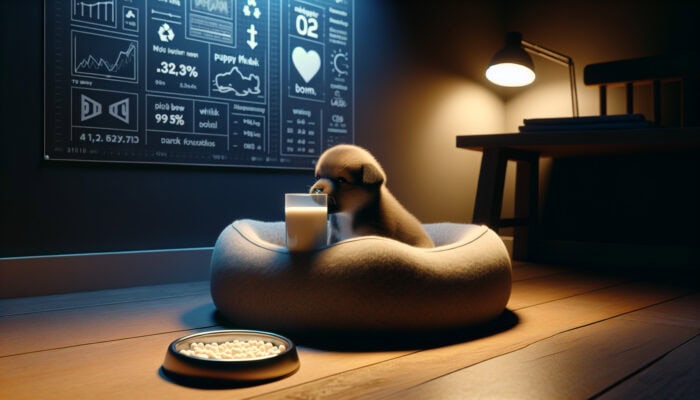Essential Steps for Preparing Your Home for Your New Puppy
Designing a Safe and Inviting Space for Your Puppy

Creating a peaceful and secure environment for your new puppy is paramount to helping them settle in and feel protected during their first night in your home. Utilising a crate or puppy pen offers a snug refuge where they can retreat and unwind whenever they feel the need. This designated area should be situated away from the hustle and bustle of daily activities and noise, as this will aid in alleviating stress and anxiety for your puppy. To elevate the comfort and security of this sanctuary, include vital items that cater to their needs, such as:
- Soft bedding that provides warmth and comfort, ensuring your puppy quickly feels at home.
- Toys designed to keep them entertained and mentally stimulated during their quiet moments.
- Water bowl to guarantee they remain hydrated throughout the night.
- Training pads to manage any possible accidents.
- Comfort item such as a piece of your clothing to impart a sense of familiarity and soothe them.
- Calming aids like a pheromone diffuser to assist in alleviating anxiety.
- Crate cover to foster a den-like atmosphere, further boosting their sense of security.
Establishing this nurturing environment will greatly assist your puppy in associating their new home with safety, comfort, and love, paving the way for a seamless and positive transition into their new life.
Thoroughly Puppy-Proofing Your Home for Safety
Puppy-proofing your living space is a fundamental action for ensuring the safety of your new furry friend. Puppies are inherently curious beings and may inadvertently find themselves in precarious situations if potential dangers are left unchecked. To cultivate a secure environment for exploration, it is vital to eliminate any risks, including electrical cords, toxic plants, and unsecured rubbish bins. Here’s a comprehensive list of common household hazards to be vigilant about:
- Cords and cables that may entice puppies to chew.
- Toxic plants such as lilies and philodendrons.
- Small objects that pose choking hazards.
- Household cleaners and chemicals that could be harmful.
- Medications that could be ingested.
- Furniture edges that may be sharp or pose risks.
- Open windows or balconies lacking screens.
By taking these precautions, you will significantly mitigate the risk of accidents, allowing your puppy to explore safely while feeling secure within their new surroundings.
Selecting the Perfect Bed for Your Puppy’s Comfort
Choosing the right bed for your puppy is essential to ensure they experience restful and restorative sleep. A bed that accommodates their size will allow them to stretch out and curl up comfortably, facilitating a peaceful night’s rest. Position the bed in a warm, draft-free location to maintain a cosy atmosphere. Keep these crucial tips in mind when selecting the most suitable bed material for your puppy:
– Memory foam beds offer exceptional support and comfort, especially beneficial for growing puppies.
– Washable covers are vital for easy cleaning, as accidents are commonplace with young pups.
– Seek out water-resistant materials to safeguard against spills or accidents.
– Choose non-toxic materials that will not harm your puppy should they chew or ingest them.
Creating a comfortable sleeping space significantly enhances your puppy's overall well-being, helping them feel secure and relaxed during their first night in your home.
What Should You Feed Your Puppy on Their First Night?

Selecting the Best Puppy Food for Healthy Growth
Choosing high-quality puppy food is vital for your puppy's healthy growth and development. A well-balanced diet will cater to their nutritional requirements while supporting their energetic lifestyle. It is advisable to consult your veterinarian for tailored recommendations to ensure your puppy achieves optimal health. When selecting puppy food, concentrate on these essential nutrients:
- Protein for muscle development and energy.
- Fats for maintaining healthy skin and a shiny coat.
- Carbohydrates for energy and aiding digestive health.
- Vitamins for promoting overall health and immune support.
- Minerals such as calcium and phosphorus for robust bones.
- Omega fatty acids for optimal brain and eye development.
A balanced diet will lay a solid foundation for your puppy's health as they adapt to their new environment, ensuring they thrive both physically and mentally.
Establishing a Consistent Feeding Schedule for Your Puppy
Creating a structured feeding schedule is essential for establishing routine and stability for your puppy. Feeding them at the same times each day allows them to anticipate their meals, which reduces anxiety while enhancing digestion. Keep a close eye on their intake to avoid overfeeding, which can lead to serious health issues. Signs of a healthy appetite in a puppy include enthusiasm during mealtimes, consistent weight gain, and adequate energy levels throughout the day. By maintaining a regular feeding schedule, you will cultivate healthy habits that will benefit your puppy for years to come.
Ensuring Your Puppy Has Access to Fresh Water

Providing access to fresh water is critical for your puppy's health and well-being. Keeping a clean water bowl filled with fresh water ensures that your puppy stays hydrated, particularly after play sessions or meals. Remember to clean the water bowl daily to prevent bacterial growth and maintain optimal hygiene. A general guideline is that a puppy should drink between 0.5 to 1 ounce of water per pound of body weight each day. Monitoring their water intake will allow you to effectively gauge their hydration needs and overall health.
Gradually Introducing Solid Foods to Your Puppy
Transitioning your puppy to solid foods should be a gradual process to avoid gastrointestinal discomfort. Begin by mixing their puppy food with water or puppy formula, allowing them to acclimate to the new texture and taste. Over time, slowly increase the solid content while reducing the liquid, ensuring a smoother transition. This gradual introduction helps your puppy adjust to solid foods without distress, ensuring they enjoy their meals and receive the vital nutrients necessary for healthy growth.
Expert Insights on Tips for a Successful First Night with Your New Puppy
Recognising and Understanding Your Puppy’s Behaviour
Puppies may exhibit signs of anxiety or fear during their first night in a new home. Understanding these behaviours enables you to respond effectively and provide the necessary comfort. Common signs of stress include whining, pacing, or excessive barking. For instance, a puppy may cry when left alone in their crate, indicating feelings of insecurity. By recognising these behaviours, you can take proactive steps to alleviate their stress, such as providing gentle reassurances and engaging in calming activities.
Utilising a soft voice and gentle touch can significantly help to calm your puppy, making their first night more manageable and pleasant.
Implementing Effective Calming Techniques for Puppies
Utilising calming techniques can greatly ease your puppy's anxiety during their first night at home. Start by engaging in gentle petting, speaking softly, and using reassuring tones to create a sense of safety. Consider employing calming aids such as pheromone diffusers, which can mimic natural comforting scents that help soothe puppies. Here are some actionable steps you can take to implement these calming techniques effectively:
– Create a calm environment by minimising noise and distractions.
– Use soft bedding and a favourite toy to create a comfortable nest for your puppy.
– Spend quality time with your puppy before bed to foster trust and comfort.
– Establish a consistent bedtime routine to signal that it’s time to relax.
These practices not only assist your puppy in adjusting to their new surroundings but also strengthen the bond between you and your new furry friend.
Building Trust with Your New Puppy
Establishing trust with your puppy is essential for nurturing a harmonious relationship. Spending quality time together allows you to understand your puppy’s unique personality, making them feel secure in your presence. Positive reinforcement is a powerful method to encourage good behaviour and foster trust. For example, when your puppy sits calmly in their crate, reward them with treats and praise. This reinforces their positive actions and helps them associate their crate with safety and rewards. Trust-building is crucial, as it lays the foundation for a lasting bond that will strengthen throughout your puppy's life.
How Can You Help Your Puppy Sleep Through the Night?
Creating a Calming Bedtime Routine for Your Puppy
Establishing a calming bedtime routine signals to your puppy that it’s time to wind down and prepare for sleep. A consistent routine can promote better sleep patterns and help your puppy feel secure in their new environment. Consider incorporating soothing activities such as a final potty break and a gentle bedtime story to assist them in transitioning into sleep mode.
The benefits of a bedtime routine are plentiful: it not only helps your puppy feel secure but also strengthens the bond between you as they learn to trust you to guide them through their nightly schedule.
Effectively Managing Nighttime Whining in Puppies
Nighttime whining is a common behaviour among puppies as they may feel lonely or uncomfortable in their new environment. It’s essential to respond calmly and consistently to their needs without inadvertently reinforcing the behaviour. If your puppy whines, first assess if they need a potty break or comfort. If they do not require anything, try soothing them with gentle words or a soft touch without removing them from their crate, as this could reinforce the whining behaviour.
Creating an environment that minimises stress is crucial by ensuring they have everything they need for comfort, such as toys and a cosy blanket. Over time, your puppy will learn to settle in and sleep through the night without excessive whining.
Handling Nighttime Accidents with Care
Nighttime accidents are a natural occurrence for new puppies as they adjust to their new home and establish bathroom habits. When accidents occur, it’s crucial to clean the mess promptly and thoroughly to prevent lingering odours that might encourage further accidents. Use enzymatic cleaners specifically designed for pet messes to effectively eliminate stains and odours.
Utilising positive reinforcement for successful potty breaks will encourage your puppy to continue this behaviour. To minimise nighttime accidents, limit water intake before bedtime, take them out for a potty break right before sleep, and consider using a crate for training. These steps will help establish good habits and significantly reduce accidents during the night.
What Are the Best Ways to Bond with Your Puppy on Their First Night?
Engaging in Quality Time Together with Your Puppy
Participating in playtime and cuddling with your puppy on their first night is an excellent way to foster a strong connection. This time spent together helps you learn about your puppy’s unique personality, preferences, and comfort zones. Activities such as gentle tug-of-war with a soft toy, playing hide-and-seek, or simply relaxing together on the couch can help create a lasting bond. Here’s a list of engaging bonding activities to consider:
- Interactive play with toys specifically designed for puppies.
- Cuddling sessions on the couch to promote feelings of comfort and security.
- Gentle grooming to familiarise them with being touched.
- Short walks to explore the neighbourhood together and build trust.
- Training sessions for basic commands using treats as rewards to reinforce learning.
- Positive reinforcement for good behaviour to encourage a trusting relationship.
- Quiet time with soft music or calming sounds to help them relax.
These activities will not only strengthen your bond but also help your puppy feel secure and loved in their new home, laying the groundwork for a strong relationship.
Applying Positive Reinforcement Techniques for Training
Utilising positive reinforcement is an effective tool in training and bonding with your puppy. Rewarding your puppy with treats, praise, or affection for good behaviour encourages them to repeat those actions. For instance, if your puppy sits calmly or successfully follows a command, offering a treat or enthusiastic praise reinforces that behaviour. This method fosters a trusting relationship, builds their confidence, and strengthens the bond between you and your puppy.
Incorporating positive reinforcement into your training regimen will aid your puppy in learning essential behaviours more effectively while creating a happy and secure atmosphere.
Introducing Your Puppy to Family Members Gradually
Introducing your puppy to family members should be approached calmly and in a controlled manner. This ensures a positive experience for both your puppy and your family. Begin by allowing your puppy to meet one family member at a time, as too many faces at once can overwhelm them. Encourage gentle interactions, such as soft petting or calm voices, to build trust and reinforce positive associations with each family member.
Consider these effective tips for managing introductions:
– Maintain a calm environment during introductions to prevent overwhelming your puppy.
– Allow your puppy to approach at their own pace without forcing interactions.
– Use treats and praise to reinforce positive interactions, enhancing their confidence.
– Ensure family members avoid sudden movements or loud noises that could startle your puppy.
These strategies will help your puppy feel more secure and accepted among family members, facilitating a harmonious living environment as they settle in.
Proven Strategies for a Successful First Night with Your New Puppy
Setting Realistic Expectations for Your First Night
The first night with a new puppy can often be a challenging experience, filled with excitement and uncertainty. It is essential to understand that your puppy may experience anxiety or fear, which could lead to whining or accidents. Be patient, as this transition is significant for them. Recognising common first-night challenges, such as reluctance to sleep alone or experiencing nighttime accidents, will help you prepare and respond more effectively.
Accepting that there may be setbacks allows you to approach the night with a calm demeanour, ensuring your puppy feels secure and loved. This understanding ultimately sets the stage for a smoother adjustment period for both you and your new furry friend.
Maintaining Consistency in Routine for Your Puppy
Maintaining consistent routines and rules is vital for providing your puppy with structure and security. Consistency in training, feeding, and playtime will help your puppy understand what to expect, reducing anxiety and fostering positive behaviours. Establish a daily schedule for feeding, potty breaks, playtime, and bedtime to create a well-balanced environment for your puppy.
To maintain consistency in training, ensure that everyone in the household follows the same commands and rules. This approach helps eliminate confusion for your puppy, reinforcing their understanding of expectations while strengthening their overall sense of security.
Seeking Professional Assistance When Necessary
If you encounter challenges during your puppy's first night, don’t hesitate to seek professional help. Consulting a professional trainer or behaviourist can provide tailored guidance specific to your puppy's needs. Look for signs that may indicate a need for assistance, such as persistent anxiety, reluctance to eat, or difficulties with potty training.
Professional trainers can offer personalised training plans and strategies to address specific behavioural concerns, ultimately helping you and your puppy navigate the challenges of this transitional period with confidence and success.
Ensuring the Health and Safety of Your New Puppy
Scheduling a Vet Visit for Your Puppy
Booking a vet appointment within the first few days of bringing your puppy home is crucial to ensuring their health and overall well-being. Early veterinary visits facilitate a comprehensive health check, vaccinations, and discussions about preventative care. How soon should you take your puppy to the vet? Ideally, you should schedule an appointment within 72 hours of bringing them home to confirm their health status and initiate necessary vaccinations.
During this visit, your vet can assess your puppy for any parasites, discuss nutrition, and answer any questions you may have regarding their care, ensuring you are well-informed as a new puppy owner.
Monitoring Your Puppy’s Health Regularly
Monitoring your puppy's health is essential as they transition into their new home. Watch for signs of illness, including lethargy, vomiting, or diarrhoea, as these can indicate potential health issues. Keeping a record of their health and behaviour helps you identify any trends or changes that may warrant veterinary attention. Here are key symptoms to keep an eye on:
- Lethargy or decreased energy levels, which may indicate illness.
- Loss of appetite or reluctance to eat, signalling health concerns.
- Vomiting or diarrhoea, which should be addressed promptly.
- Coughing or difficulty breathing, indicating potential respiratory issues.
- Excessive scratching or signs of skin irritation that could require treatment.
Being vigilant in observing these symptoms will allow you to intervene early, ensuring your puppy's health and happiness as they adjust to their new life.
Creating a Safe Environment for Your Puppy to Thrive
Establishing a safe home environment is vital for your puppy’s overall well-being. Ensure that your home is free of hazards while providing access to safe toys and chews. Opt for toys designed specifically for puppies, as these will be more appropriate for their developing teeth and chewing habits. Consider the following tips for selecting safe toys:
– Choose toys made from non-toxic materials to eliminate health risks.
– Opt for durable toys that can withstand aggressive chewing while ensuring safety.
– Look for size-appropriate toys to prevent choking hazards and ensure play safety.
– Avoid toys with small parts that could be ingested and cause serious harm.
A safe environment will allow your puppy to explore freely while minimising the risk of accidents or injuries, promoting healthy development as they grow.
Establishing a Comprehensive Vaccination Schedule for Your Puppy
Working closely with your veterinarian to establish a vaccination schedule is critical for protecting your puppy from common diseases. Vaccinations are essential for your puppy’s health, helping to build immunity against potentially fatal illnesses. Keep track of vaccination dates and follow-up appointments to ensure your puppy remains up-to-date on their shots. This proactive approach will safeguard your puppy's health while providing you with peace of mind.
Regular check-ups will also allow your vet to monitor your puppy's growth and development, addressing any concerns that may arise as they mature.
Implementing Preventative Care Measures for Your Puppy
Discussing preventative care measures with your vet is crucial for maintaining your puppy's long-term health and well-being. This includes discussing flea, tick, and heartworm prevention strategies. Regular grooming and checks for any signs of parasites or skin issues are essential components of a solid preventative care plan.
Taking proactive steps in these areas will help ensure your puppy stays healthy, comfortable, and happy as they grow and adjust to their new life with you, fostering a positive and lasting relationship.
Frequently Asked Questions About New Puppies
What should I prepare before bringing my puppy home?
Prepare a safe space equipped with a comfortable bed, engaging toys, and clean water. Puppy-proof your home by removing hazards and setting up a designated feeding area.
How can I help my puppy feel secure on their first night?
Create a quiet, cosy space with their bed and toys. Spend quality time with your puppy, utilising calming techniques and positive reinforcement to build trust and security.
What should my puppy's first meal consist of?
Choose a high-quality puppy food that meets their specific nutritional needs. Start with a mix of food and water or puppy formula to ease their transition into solid food.
How can I establish a feeding schedule for my puppy?
Feed your puppy at the same times each day to create a routine. Monitor their intake closely and watch for signs of a healthy appetite to ensure proper nutrition.
Is it normal for puppies to whine at night?
Yes, whining is common as puppies may feel anxious or lonely in a new environment. Respond calmly and provide comfort without reinforcing the behaviour.
What should I do if my puppy has an accident at night?
Clean up promptly with an enzymatic cleaner to eliminate odours and avoid punishment. Reinforce successful potty breaks with positive reinforcement to encourage good habits.
How long will it take for my puppy to sleep through the night?
Every puppy adjusts differently, but with patience and a consistent routine, many puppies begin sleeping through the night within a few weeks.
What are the signs of illness in a puppy?
Watch for symptoms such as lethargy, loss of appetite, vomiting, diarrhoea, excessive scratching, or coughing. Promptly consult a vet if you notice any of these concerning signs.
When should I schedule my puppy's first vet appointment?
Schedule a vet visit within 72 hours of bringing your puppy home to ensure their health and initiate vaccinations as soon as possible.
How can I bond with my puppy on the first night?
Engage in interactive playtime, cuddling sessions, and gentle interactions to foster a strong connection. Utilise positive reinforcement to encourage good behaviour and build trust.
Connect with us on Facebook for more tips!
The Article First Night Tips For New Puppies: Essential Guide First Published On https://elgatoencasa.com
The Article New Puppies: Essential First Night Tips Guide Was Found On https://limitsofstrategy.com

